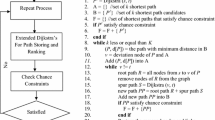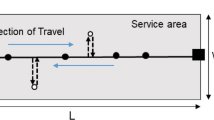Abstract
Demand and supply uncertainties at schedule-based transit network levels strongly impact different passengers’ travel behavior. In this paper, a new multi-class user reliability-based dynamic transit assignment model is presented. Passengers differ in their heterogeneous risk-taking attitudes towards the random travel cost. The stochastic characteristics of the main travel cost components (in-vehicle travel time, waiting time, and early or late penalty) are demonstrated by specifying the demand and supply uncertainties and their interactions. Passenger route and departure time choice is determined by each passenger’s respective reliability requirements. Vehicle capacity constraint for random passenger demand is handled by an in-vehicle congestion parameter. The proposed model is formulated as a fixed-point problem, and solved by a heuristic MSA-type algorithm. The numerical result shows that the risk-taking attitude will impact greatly on passengers’ travel mode and departure time choices, as well as their money and time costs. This model is also capable of generating transit service attributes such as the stochastic vehicle dwelling time and the deviated timetable.
Similar content being viewed by others
References
Adamski A (1992) Probabilistic models of passengers service processes at bus stops. Transp Res 26B:253–259
Bell MGH, Schmöcker JD, Iida Y, Lam WHK (2002) Transit network reliability: an application of absorbing Markov chains. In: Taylor MAP (ed) Proceedings of the 15th international symposium on transportation and traffic theory. Elsevier Science, Amsterdam, pp 43–62
Chen A, Ji Z, Recker W (2002) Travel time reliability with risk-sensitive travelers. J Transp Res Board 1873:27–33
Cominetti R, Correa J (2001) Common lines and passenger assignment in congested transit networks. Transp Sci 35:250–267
De Cea J, Fernandez E (1993) Transit assignment for congested public transport system: an equilibrium model. Transp Sci 27:133–147
Gasinski L, Papageorgiou NS (2005) Nonlinear analysis. Chapman & Hall/CRC, London
Hamdouch Y, Lawphongpanich S (2008) Schedule-based transit assignment model with travel strategies and capacity constraints. Transp Res 42B:663–684
Hickman MD (2001) An analytic stochastic model for the transit vehicle holding problem. Transp Sci 35:215–237
Kurauchi F, Bell MGH, Schmöcker JD (2003) Capacity constrained transit assignment with common lines. J Math Model Algorithms 2:309–327
Lam WHK, Cheung CY, Poon YF (1998) A study of train dwelling time at the Hong Kong mass transit railway system. J Adv Transp 32:285–296
Lam WHK, Shao H, Sumalee A (2008) Modeling impacts of adverse weather conditions on a road network with uncertainties in demand and supply. Transp Res 42B:890–910
Larrain H, Muñoz JC (2008) Corridor assignment assuming congestion due to passenger boarding and alighting. Netw Spat Econ 8:241–256
Lo H, Luo XW, Siu BWY (2006) Degradable transport network: travel time budget of travelers with heterogeneous risk aversion. Transp Res 40B:792–806
Noland RB, Polak JW (2002) Travel time variability: a review of theoretical and empirical issues. Transp Rev 22:39–54
Nuzzolo A, Russo F, Crisalli U (2001) A doubly dynamic schedule-based assignment model for transit networks. Transp Sci 35:268–285
Nuzzolo A, Russo F, Crisalli U (2003) Transit network modeling: the schedule-based dynamic approach. Franco Angeli srl, Milana, Italy
Poon MH, Wong SC, Tong CO (2004) A dynamic schedule-based model for congested transit networks. Transp Res 38B:343–368
Powell WB, Sheffi Y (1983) A probabilistic model of bus route performance. Transp Sci 17:376–404
Schmocher JD, Bell MGH, Kurauchi F (2008) A quasi-dynamic capacity constrained frequency-based transit assignment model. Transp Res 42B:924–945
Sheffi Y (1985) Urban transport networks: equilibrium analysis with mathematical programming methods. Prentice-Hall Inc, Englewood Cliffs
Spiess H, Florian M (1989) Optimal strategies: a new assignment model for transit networks. Transp Res 23B:83–102
Szeto WY, Solayappan M Wong KI (2009) Reliability-based stochastic transit assignment with capacity constraints. CD-ROM of 11th international conference on advanced systems for public transport, Hong Kong SAR
Teklu F, Watling D, Connors R (2007) A Markov process model for capacity constrained transit assignment. In: Transportation and traffic theory, pp 483–506
Wilson N, Nuzzolo A (2004) Schedule-based dynamic transit modeling—theory and application. Kluwer Academic, Dordrecht
Wirasinghe SC (2003) Initial planning for urban transit systems. In: Advanced modeling for transit operations and services planning. Elsevier, Amsterdam
Yang L, Lam WHK (2006) Probit-based reliability-based transit assignment model. Transp Res Rec 1977:154–163
Zhang YQ, Lam WHK, Sumalee A (2009) Dynamic transit assignment model for congested transit networks with uncertainties. CD-ROM of 88th transportation research board meeting, Washington, DC
Author information
Authors and Affiliations
Corresponding author
Rights and permissions
About this article
Cite this article
Zhang, Y., Lam, W.H.K., Sumalee, A. et al. The multi-class schedule-based transit assignment model under network uncertainties. Public Transp 2, 69–86 (2010). https://doi.org/10.1007/s12469-010-0027-4
Published:
Issue Date:
DOI: https://doi.org/10.1007/s12469-010-0027-4
Keywords
- Reliability-based stochastic user equilibrium
- Schedule-based transit assignment
- Multi-class
- Demand uncertainty
- Supply uncertainty
- Capacity constraint




